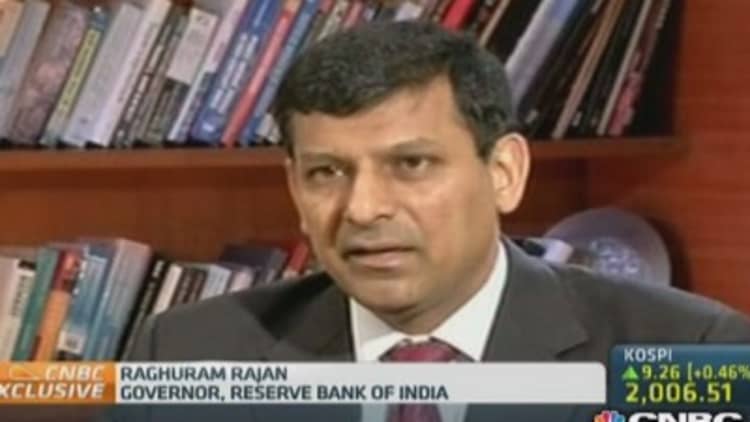
India's rupee has climbed to more than seven-month highs, but the country's central bank governor isn't yet worried about the rise or whether it will affect exports.
"I am not worried about overvaluation at this point," Raghuram Rajan, governor of the Reserve Bank of India (RBI), told CNBC. "A certain amount of leeway this way, that way is fine," he said.
"We obviously don't want to reach a level where we think we'll have renewed volatility because that's too strong," he said. "We would take precautionary measures to reduce volatility at that point. I think you have to be somewhat agnostic over the range."
Read MoreRupee on a roll, but how far will it go?
On Wednesday, the U.S. dollar was fetching as little as 59.81 rupees, as the Indian currency reached its strongest level since July of last year. The rupee's strength is particularly striking after it plunged 24 percent from the start of May to the end of August last year, touching record lows of near 70 to the dollar amid concerns about the U.S. Federal Reserve's plan to begin tapering its asset purchases as well as India's economic fundamentals.
A combination of factors has fueled the currency's appreciation – including an improvement in economic fundamentals such as the current account, together with Rajan's proactive approach to monetary policy. While India's merchandise exports posted their first decline in eight months in February, Rajan said he isn't concerned the rupee strength is damping demand for the country's goods overseas.
"I don't think that is primarily because of the recent movements in the exchange rate," Rajan said. "It's too quick. These things take time to have effect. What we're exporting today is what was contracted three to four months ago. And today's exchange rate has nothing to do with those levels of exports."
Instead, Rajan believes a slowdown in the economic recovery in developed markets in the first quarter is the culprit for export sluggishness. But he would be concerned if the rupee were to strengthen substantially to levels around 45-50 against the U.S. dollar.
"Some of our competitor emerging markets have depreciated currencies," he noted.
Read MoreThis India bank doesn't expect a rate cut anytime soon
Keeping exports growing has been key to the country's improving economic fundamentals, with several months of export increases helping to bring India's current account deficit down to manageable levels. Exports also make up around 16 percent of gross domestic product (GDP), which has been pressured by high inflation.
Economic growth in Asia's third-largest economy has been stuck below 5 percent for the past seven quarters, a far cry from the days of over 9 percent enjoyed in the three fiscal years prior to the global financial crisis. Inflation has been running at rates above 8 percent.
Read MoreWorld's biggest election: Game changer for India?
Rajan believes that there are encouraging signs that inflation may be easing, with the potential for food prices to ease and the possibility oil prices may stabilize or even decline.
"Once inflation comes down, there will be substantial benefits to the economy, both from the increased savings which will help create more capital for industry as well as this uncertainty about the future path of interest rates will be diminished," Rajan said.
Read MoreLast 'BRIC' standing: Why analysts like India now
The RBI has hiked rates three times by a total of 75 basis points to contain price pressures since last September, when Rajan took over the helm. Last week, the RBI kept rates unchanged at 8 percent in a widely anticipated move.
"We're not trying to accelerate the process of disinflation by cranking up the interest rate machine as high as possible," he said. "Certainly, if we think that there is room that has built up because we can achieve it with even lower interest rates, we'd be happy to cut. But we have to make the judgment as and when the time comes."
—By CNBC.Com's Leslie Shaffer; Follow her on Twitter @LeslieShaffer1

